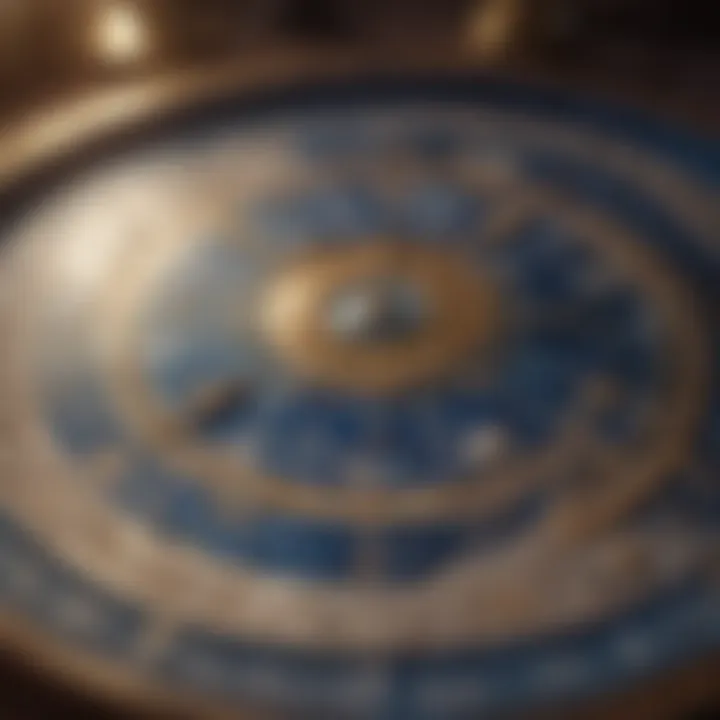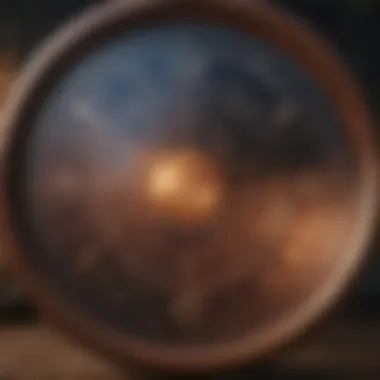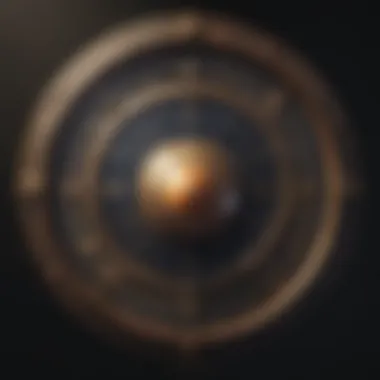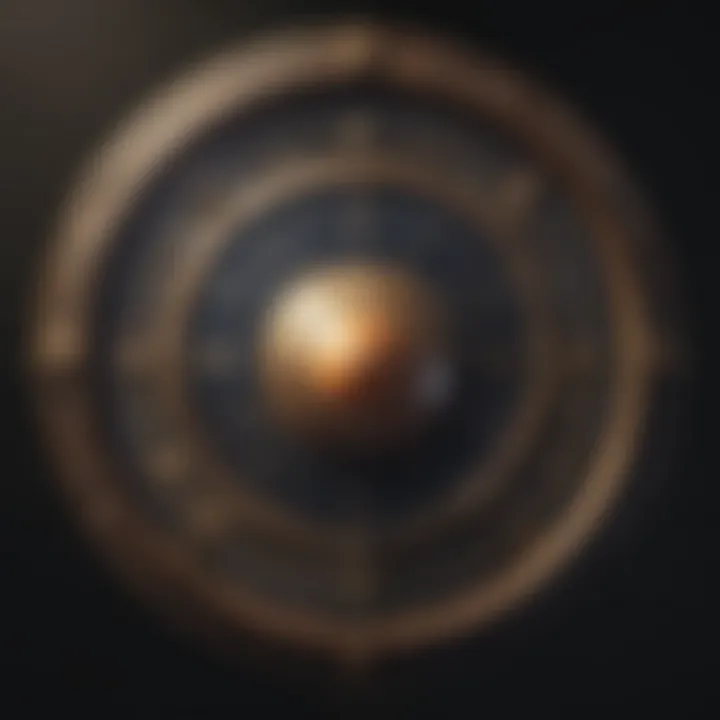Navigating Natal Charts: Access and Insights Online


Intro
Astrology often feels like a tapestry woven from the stars—complex yet deeply personal. A natal chart, also known as a birth chart, serves as a detailed map of the sky at the exact moment of one’s birth. It captures the positions of celestial bodies, including planets, the sun, and the moon, which many belief influence our personalities and life paths. Understanding this chart could provide potent insights into various aspects of life, from career choices to relationship dynamics. In this guide, we will explore how to access and interpret your natal chart online, aiming to make this often-overlooked area of astrology more accessible for everyone, whether you’re a curious beginner or a seasoned astrologer.
Understanding the Zodiac
Overview of Zodiac Signs
The Zodiac comprises twelve distinct signs, each representing a specific time of the year when the sun resides in that part of the sky. From Aries, the fiery start of the astrological year, to Pisces, the introspective finale, each sign plays a pivotal role in shaping our personality traits and life experiences. It’s not just a matter of when you were born; it's also about the energies of these signs that flow into you.
Sign Traits and Characteristics
Every zodiac sign is imbued with its traits. For instance:
- Aries: Bold and ambitious, often putting themselves out there.
- Taurus: Known for resilience and strong determination.
- Gemini: Quick-witted and adaptable, they thrive on communication.
- Leo: Natural leaders, endowed with charisma and confidence.
- Scorpio: Mysterious and intense, they feel deeply.
These traits can give you a sense of the thematic essence underlying your chart, but they do not tell the whole story. What’s crucial is how these traits manifest in your own life.
Elemental Qualities
Each sign is associated with one of four elements: Fire, Earth, Air, and Water. This elemental quality adds another layer of interpretation to your cosmic makeup. For instance:
- Fire: Signs like Aries, Leo, and Sagittarius are often full of passion.
- Earth: Taurus, Virgo, and Capricorn tend to be more grounded and pragmatic.
- Air: Gemini, Libra, and Aquarius usually embody intellectual curiosity.
- Water: Cancer, Scorpio, and Pisces are often intuitive and emotional.
Comprehending these elemental associations can deepen your interpretation of both your zodiac sign and your natal chart as a whole.
Astrological Insights
Current Astrological Trends
Keeping up with current celestial events is vital for astrological work. The movement of planets can highlight specific areas of life for personal growth and emotional exploration. For example, when Mercury goes retrograde, communication often hits a snag. Getting to grips with these trends could enhance your readings and predictions.
Influence of Celestial Events
Celestial events—like eclipses or planetary conjunctions—act as markers in the sky, signaling potential shifts. For example, a full moon might prompt deep emotional releases, while a solar eclipse often invites fresh beginnings. Watching for these signals can help you really tune into your natal chart’s nuances.
How to Interpret Your Birth Chart
Interpreting a natal chart isn’t as daunting as it seems. Here are a few steps to help you dive into your personalized cosmic narrative:
- Locate Your Sun, Moon, and Rising Signs: These are the pillars of your astrological identity.
- Consider the Houses: Each segment of your chart tells a story about different life areas—from relationships to career.
- Analyze the Planetary Positions: Each planet contributes unique energy; understanding their placements can unlock deeper meanings.
"Your natal chart is akin to a cosmic fingerprint—uniquely yours yet born from the collective celestial dance."
Horoscope and Predictions
Monthly or Weekly Forecasts
Delving into your weekly or monthly horoscope can provide practical guidance—helping you navigate the ups and downs of life. By aligning your actions with cosmic rhythms, you can optimize your opportunities.
Personalized Horoscope Reading
Unlike general horoscopes, a personalized reading takes into account your entire natal chart. You gain a tailored roadmap that points out where planetary movements might impact your life most profoundly.
Compatibility Readings based on Zodiac signs
Understanding compatibility based on zodiac signs offers insight into relationship dynamics. For example, a Cancer might find comfort in a Taurus’s stability, while a Leo may crave the excitement of an Aries. Recognizing such underlying patterns adds another layer to interpersonal relations.
Navigating your natal chart online is not merely reading a list of celestial placements; it’s about creating an understanding of your unique place in the universe. With a combination of historical insights and modern tools, one can uncover their deeper self, fostering personal growth and meaningful connections.
Understanding Natal Charts
Understanding natal charts is fundamental to grasping how astrology seeks to illuminate the intricate tapestry of human experiences. A natal chart serves as a cosmic blueprint, crafted at the precise moment of one’s birth, revealing the unique arrangements of celestial bodies at that time. Through the lens of this chart, individuals can gain insightful clarity about their personality, life patterns, and potential paths.
The significance of understanding these charts lies not only in personal introspection but also in enhancing one's relationship dynamics. When individuals explore their natal charts, they often uncover latent traits and tendencies which may have unnoticed influences on their interactions with others. By understanding these factors, one can improve their emotional intelligence and foster healthier relationships.
Moreover, recognizing the essential components of a natal chart—such as planets, houses, and signs—fosters a greater appreciation for astrological practices. Each component carries its own depth and intricacies, which in combination sketch a multi-faceted portrait of an individual’s life journey.
In this section, we will delve into the definition of a natal chart, its historical evolution, and the key components that play an integral role in astrological interpretation.


Definition of a Natal Chart
A natal chart, also known as a birth chart, is a map of the sky as viewed from a specific location at the exact time of one’s birth. It encapsulates the positions of the planets in relation to Earth, along with various astrological elements, to paint a personalized picture of an individual’s potential and challenges throughout life.
Historical Context and Evolution
The concept of natal charts isn't new; it has roots that stretch across different cultures and centuries. Ancient civilizations, such as the Babylonians, used celestial observations to predict events and understand human behavior. Over the years, astrology evolved significantly, transitioning through Greek, Roman, and later, Renaissance influences. Each era added layers of complexity to astrological practices, leading us to the rich, nuanced field we know today. Understanding this history is vital for appreciating how we arrived at current interpretations of natal charts.
Key Components of Natal Charts
A natal chart comprises several key components, each contributing to the overall narrative of an individual's life. The three primary elements of this chart are planets, houses, and signs. Their interactions create a unique map of potentialities.
Planets
Planets in a natal chart symbolize various facets of human experience. Each celestial body holds a specific significance; for instance, Mars embodies assertiveness and energy, while Venus represents love and beauty. The placement of these planets serves as a reflection of personal traits and influences decision-making processes. The beauty of incorporating planets into natal chart interpretation lies in their dynamic nature; they can indicate strengths and challenges that may arise throughout life. However, it’s essential to approach this aspect with caution. Relying too heavily on planetary positions can lead to oversimplified interpretations.
Houses
Houses in astrology represent different areas of life experience, like relationships, career, and personal growth. Each house corresponds to a specific zodiac sign and is affected by the planets located within. This spatial arrangement informs an astrologer about how and where planetary energies express themselves in a person’s life. A notable advantage of this structure is the ability to identify focal areas for growth or attention. However, the complexity of house interactions could complicate readings if not adequately understood, necessitating further exploration to draw meaningful insights.
Signs
Astrological signs depict the characteristics that influence individuals' behaviors and responses. Each of the twelve zodiac signs carries distinctive energies that intertwine with planets and houses in a natal chart. For example, someone with a significant placement in Scorpio may exhibit traits of intensity or depth. The clarity and familiarity of zodiac signs make them accessible to even novice astrologers, establishing a foundational understanding of astrological practice. Nevertheless, it’s important to recognize that these descriptions are general; not every trait will resonate with every individual, highlighting the need for nuanced interpretation.
The Role of Astrology in Personal Insight
Astrology often elicits a variety of responses; some see it as mere entertainment, while others view it as a crucial tool for introspection. Ignoring its potential contributions to personal insight can be a folly for those seeking deeper understanding of themselves and their relationships. Exploring the interplay of celestial mechanisms set in motion at the moment of our birth serves not just as a predictive framework, but a reflective mirror.
Astrology operates under the premise that the positions and movements of celestial bodies influence both individual and collective experiences. This narrative invites those interested to delve beyond surface-level comprehension and consider the broader implications. Some etiquettes in understanding how astrology offers insights include:
- Completing the Self-Portrait: A natal chart is like a sophisticated, intricate puzzle. Each piece—the planets, signs, and houses—tells a story. Understanding your astrological makeup allows for deeper self-awareness, illuminating aspects of personality that might otherwise remain obscured.
- Navigating Relationship Dynamics: Insights gleaned from natal charts can profoundly affect interpersonal relationships. Recognizing how different energies interact fosters compassion and understanding. Imagine having your partner’s astrological chart beside your own; you can see potential areas of friction or synergy that may not be immediately apparent.
- Life Cycles and Flow: Astrology teaches us about the cyclical nature of existence. Through transits and progressions, one learns to anticipate shifts and navigate the ebbs and flows of life. This knowledge can be particularly empowering in periods of transition, providing a sense of control amidst uncertainty.
Understanding Personality Traits
When it comes to delineating personality traits, astrology reveals layers of complexity. Your Sun sign might be the first piece of the puzzle, but it’s merely the tip of the iceberg. Each planet's placement enriches this portrait further. For example, someone may have a Leo Sun, often aligned with boldness and charisma, yet a Moon in Pisces can temper this with sensitivity and empathy. Such dissonance often sheds light on inner conflicts that might otherwise lead to misunderstanding oneself.
A few key takeaways in this regard include:
- Sun, Moon, and Rising: The trio delineates one’s core identity, emotional sphere, and outward persona. Understanding these facets leads to a more rounded self-perception.
- Planetary Placements: Each planet governs distinct life themes. Mercury, for instance, represents communication and thought processes. Thus, its position in your natal chart will reflect how you articulate your ideas or how you process information.
- Aspects: The angles formed between planets articulate how different components of your personality interact with one another. A square aspect between Mars and Saturn might indicate frustrations in self-expression, while a trine suggests harmonious interactions.
Interpreting Life Cycles and Patterns
Astrological understanding guides you through the rhythms of life, allowing one to interpret and appreciate cycles. Saturn returns and progressed moons serve as markers for significant life events, often heralding periods of growth or challenge.
Recognizing these patterns gives people a heads-up, enabling them to align their decisions with cosmic timing. Some notable considerations include:
- Saturn Returns: Occurring approximately every 29.5 years, this period signifies maturation and often accompanies life-shifting decisions.
- Transits: Observing how current planetary movements interact with your natal chart can prepare you for the influences that may enter your life.
- Progressions: Tracking progressed planets allows you to witness your internal evolution over time, revealing subtler shifts in focus and aspiration.
In summary, the role of astrology in personal insight can't be overstated. It opens up avenues for self-exploration, illuminating qualities often hidden or unrecognized. Embracing this intricate web can lead to dynamism between self-awareness, relationship enhancement, and navigating life’s many ups and downs.
Accessing Natal Charts Online
When it comes to exploring the cosmic blueprint of your life, accessing natal charts online has become a vital step for those delving into astrology. Gone are the days when such wisdom was locked away in dusty tomes or hidden behind the doors of exclusive astrology shops. Today, the internet offers a vast sea of resources, making it easier to gain insights into your personal planetary alignments.
The convenience of online tools cannot be overstated. In just a few clicks, you can uncover the intricate web of influences that the stars have woven at the moment of your birth. The importance lies not just in the ability to access these charts but in understanding how to interpret the information they reveal. Whether you're a seasoned astrologer or a casual seeker, the online universe of natal charts gives you a chance to embark on a voyage of self-discovery, tapping into your potential and illuminating the path ahead.
Key Online Platforms
Various platforms have emerged that allow you to generate your natal chart with ease. Some of the prominent players include:
- Astro.com: This site offers detailed charts and interpretations, making it a go-to for many.
- Cafe Astrology: Known for its user-friendly interface, it’s ideal for both beginners and experts alike.
- Astrodienst: A rich resource for deep dives into astrological data, offering various options tailored to individual needs.
These platforms not only provide detailed natal charts but often come with explanations that facilitate understanding, allowing users to navigate the sometimes complex language of astrology.
Comparing Different Tools
As you browse through these online resources, you'll quickly notice a variety of tools—some free, some paid—each catering to different levels of expertise and personal preference.
Free Resources
The allure of free resources cannot be ignored. They offer access to basic features like natal chart generation and simple interpretations. Whether through websites, apps, or forums, these resources allow individuals to explore astrology without financial commitment.


- Key Characteristic: Accessibility. No need to break the bank to start your astrological journey.
- Unique Feature: Many free platforms come with community forums where users exchange interpretations and insights, providing a social aspect that enhances learning.
However, the flip side can be a lack of depth. Some free services may offer surface-level insights that don’t quite delve into complexities. This might leave an astrological novice wanting more, thus prompting a shift to paid services.
Paid Services
On the flip side, paid services often come packed with features that go beyond the basic chart. Users can indulge in deeper analyses, personalized reports, and even one-on-one consultations with experienced astrologers.
- Key Characteristic: Comprehensive insights. With paid platforms, you often get more detailed analysis, unique interpretations, and tailored advice.
- Unique Feature: Many of these services use advanced algorithms to produce charts that reflect nuances often overlooked in free offerings. This can lead to meaningful revelations about one’s life journey.
While jumping into the paid realm can feel like a big step, the depth of understanding provided can well justify the cost, especially for those serious about astrological exploration.
In summary, navigating the myriad of resources available to access your natal chart can feel a bit overwhelming, but with a little research and trial, you can find the ideal platform that resonates with your personal astrological journey.
Interpreting Your Natal Chart
Interpreting your natal chart is a deep dive into the essence of who you are and how the heavens have shaped your life's path. It's more than simply looking at the sun, moon, and rising signs; it's a comprehensive analysis of various components intertwined into a unique tapestry. Each element of the chart tells its own story, illuminating the nuances of your personality, potential strengths, and even challenges that might arise along the way.
Understanding this aspect of astrology can facilitate greater self-awareness, revealing patterns and tendencies that affect behavior and relationships. More than just a celestial map, your chart serves as a guide for life's journey, highlighting where you might flourish and where you may struggle. Recognizing these influences can lead to more informed decisions in both personal and professional domains.
"Your natal chart is a mirror reflecting not just your self, but also the connections you share with the universe."
Understanding House Placements
House placements in your natal chart represent areas of your life where planetary influences manifest. Each of the twelve houses governs different aspects—from personal identity, material possessions, to societal interactions. For example, if you have a significant placement in the 7th house, which revolves around partnerships, it's likely that your relationships will play a crucial role in your life.
It’s essential to consider not only which planets reside in which houses but also how they influence each other. A Mars placement in the 10th house may push one to be ambitious in their career, while a Moon in the 4th could create a strong attachment to familial roots. By identifying the interaction between houses and placements, you can develop a clearer understanding of your motivations and desires.
The Significance of Planetary Aspects
Planetary aspects are the angles made between planets in your chart, each holding unique meanings and implications. These angles can indicate how different parts of your personality interact with one another. Positive aspects, like trines and sextiles, generally signify ease and harmony, while challenging aspects, such as squares and oppositions, highlight tensions and conflicts.
For instance, if Venus is square to Mars, this could suggest struggles between love and desire, leading to complicated relationship dynamics. Conversely, a harmonious trine between Saturn and Jupiter might indicate a balance of discipline and optimism that can be advantageous in professional pursuits.
Understanding these aspects enriches your interpretation, helping to clarify your internal landscape and relationships with those around you.
Reading the Chart: A Step-by-Step Guide
Reading your natal chart can seem daunting at first, but breaking it down into manageable sections can make it much easier:
- Identify Your Ascendant: Start with your rising sign, as it reveals how you present yourself to the world.
- Examine Sun and Moon Signs: Your sun sign defines your core identity, while your moon sign represents your emotions and inner self.
- Explore Each House: Look at the house placements of your planets to see which areas of your life are influenced by them.
- Analyze Aspects: Observe the aspects formed between your planets, noting both harmonious and challenging connections.
- Synthesize Information: Pull everything together, considering how the various elements interplay in your chart.
By approaching your chart methodically, you can better uncover the rich meanings behind each component, leading to deeper personal insights.
In summary, interpreting your natal chart is akin to unlocking a hidden code to understanding your life’s blueprint. With comprehension of house placements, planetary aspects, and a step-by-step reading approach, you can derive invaluable insights that contribute to your journey of self-discovery.
Practical Applications of Natal Chart Insights
Understanding how to use your natal chart can illuminate many paths in life. These insights, derived from the positions of celestial bodies at the time of your birth, not only reveal traits but also shed light on how to navigate life’s twists and turns. By delving into your own chart, you can apply these cosmic insights to personal development, relationships, and decision-making.
Self-Discovery Journeys
Embarking on a self-discovery journey through your natal chart can be transformative. Each planet placement and aspect offers clues to your strengths, weaknesses, and life purpose. For instance, an individual with the Sun in Leo may find that their identity is intertwined with creativity and leadership. This realization allows them to align their career choices and personal goals with their inherent traits, creating a path that feels more authentic.
Recognizing patterns tied to specific houses can also guide your exploration. If your Moon resides in the Fourth House, your emotional foundation might be linked to family and home life. This knowledge can prompt reflection on any family dynamics that may affect your emotional well-being. Here are some reflective questions you might consider:
- How do my planetary placements affect my approach to challenges?
- In what ways can I nurture my strengths further?
- Are there areas where habits or patterns have become counterproductive?
Navigating these questions instills confidence and enables growth. As you explore deeper, you uncover not just who you are but also who you have the potential to become.
Improving Relationship Dynamics
An often underappreciated aspect of natal charts is their utility in relationship dynamics. Understanding both your individual chart and those of significant others can cultivate empathy and improve interactions. For example, someone with Venus in Gemini may value communication and mental stimulation in relationships. If their partner has Mars in Taurus, they might appreciate a steadier, more grounded approach to love, which could lead to misunderstandings without awareness of these differences.
Comparing aspects in your charts can highlight areas of harmony and potential friction. Here are some points to consider when examining relationship dynamics:
- Common Interests: Where do your Sun signs align? Exploring shared values can enhance connection.
- Communication Styles: Evaluate how Mercury placements in both charts affect your interactions.
- Emotional Needs: Identify how the Moon placements interact; this is key for nurturing each other’s emotional landscapes.
"Astrology is a compass that can guide relationships, helping each party understand their emotional languages."


Acknowledging these differences fosters an environment of compassion and understanding. As couples navigate conflicts, having this celestial perspective can help articulate needs better, ultimately leading to healthier and stronger bonds.
By applying the insights gained from your natal chart in these practical ways, a new dimension of self-awareness and relational harmony becomes achievable, enhancing the everyday experience of living.
Common Mistakes in Natal Chart Interpretation
When one embarks on the journey of interpreting their natal chart, it's akin to sailing through uncharted waters. The excitement can quickly turn into confusion if certain common mistakes are made. These pitfalls not only cloud the understanding of one’s astrological profile but also dilute the profound insights that these celestial maps can provide. Understanding these missteps is essential for anyone seeking clarity and accuracy in their astrological readings.
Misunderstanding Signs and Symbols
Astrology is rich with symbols and meanings, serving as a language of its own. Each sign and symbol carries a distinct energy and significance. However, many individuals might skim over these meanings or rely solely on one source for interpretation. This can lead to confusion and incorrect conclusions about what their chart reveals.
For instance, consider the sign of Pisces. To a fresh astrologer, it might just represent intuition and creativity. But if they skip deeper study, they might miss how Piscean traits can also indicate escapism or sensitivity. When interpreting any sign or symbol, it’s crucial to:
- Dive Deep: Explore reliable astrological literature or resources to gather comprehensive meanings.
- Context Matters: Pay attention to where this sign appears within the chart. Is it in the 1st House or the 10th? Its placement significantly changes its interpretation.
- Synthesize: Combine the meanings across various sources for a richer, multifaceted understanding.
Inaccuracies stem from superficial knowledge, and without proper context or depth, one can easily misinterpret what the stars are really saying.
"Astrology is not just about sun signs; it's a symphony of elements that must be understood in harmony."
Overgeneralization of Astrological Traits
Another major mistake is the tendency to overgeneralize astrological traits. Many people see their sun sign as a catch-all identifier of their personality, reducing the complexities of their natal chart to a mere stereotype. For example, it’s easy to say someone born under Libra is charming and diplomatic. However, without acknowledging the full chart—moon signs, rising signs, and planetary placements—you might miss crucial layers of personality.
To avoid overgeneralization, consider the following:
- Look at the Whole Chart: Every aspect of a chart contributes to the individual's overall persona.
- Individual Experiences Matter: Life circumstances and personal choices shape how astrological traits manifest, which should be factored in.
- Stay Open-Minded: Don’t lock yourself into fixed beliefs about what each sign entails, as personal experiences differ widely among individuals.
Overgeneralization can lead to surface-level understanding and undermine the intricate nature of astrology. It's essential to appreciate the diversity and depth of astrological interpretations, recognizing that each individual is a unique tapestry woven from various celestial influences.
Future Trends in Online Astrology
As we dive into the shifting landscape of astrology, the future trends reveal significant transformations that promise to enhance the practice of navigating one's natal chart online. This evolution isn't just about making astrology digital; it's about redefining how individuals engage with their astrological insights. The advancements in technology and an increased appetite for personalized experiences set the stage for an exciting era in online astrology.
Technological Advancements in Astrology
The integration of technology into astrology has been nothing short of revolutionary. From 3D modeling of celestial bodies to artificial intelligence capable of interpreting complex astrological data, the tools available today are far superior to those of the past. Here are some noteworthy advancements:
- AI-Driven Insights: Some platforms now harness machine learning algorithms to provide tailored insights based on users’ natal charts. This can lead to more personalized interpretations and help individuals understand their charts beyond the traditional meanings.
- Augmented Reality (AR): With AR, users can visualize their natal charts as they would appear in the cosmos. Such immersive experiences help deepen the connection to one's astrological influences by making abstract concepts more tangible.
- Real-Time Updates: The capacity for astrological apps to provide real-time updates about planetary movements or events enhances the relevance of astrology in users’ daily lives. Being informed about the Moon phases, retrogrades, or eclipses in real-time means users can adapt and align their actions more consciously with cosmic rhythms.
These advancements not only make astrology more accessible but also deepen the interpretation and application of natal charts in daily life.
The Rise of Personalized Astrology Apps
With the surge in mobile technology, personalized astrology apps have become commonplace. These tools cater to an audience that craves specific insights tailored to their unique birth charts. Here are some ways these applications are reshaping the astrology space:
- Customized Charts and Reports: Many apps now allow users to generate detailed reports based solely on their natal chart. Users can receive information regarding their strengths, challenges, and potential life events, offering a more dynamic view than static charts from websites.
- Community Engagement: Platforms are starting to emphasize social connections, allowing users to share experiences and insights about their charts. This sense of community fosters a deeper understanding of astrology and broadens perspectives.
- Learning Resources: The best apps offer tutorials and resources to help users learn more about their natal charts, updating the often solitary journey of learning astrology into a collaborative one.
Incorporating these features ensures that astrology feels relevant and applicable, not just a relic of the past.
"The future of astrology lies in personal connections, enhanced technologies, and a commitment to providing tailored experiences that resonate deeply with individual seekers."
The Psychological Aspects of Astrology
Astrology doesn’t strictly serve as a source of mystical predictions. Many astute practitioners see it as a profound means of self-exploration and psychological growth. By delving into the celestial positions at the time of one’s birth, individuals uncover a blueprint of personality traits, tendencies, and life patterns that deeply resonate with their inner psyche. The link between astrology and psychology is vital as it provides a framework through which one can better grasp their emotional landscape and behavioral tendencies.
Understanding astrological influences aids persons in pinpointing patterns that govern their interactions and reactions. Recognizing these cosmic clues often leads to enhanced emotional intelligence, which is the cornerstone for healthier relationships and personal development. It is as if the stars serve as a mirror reflecting our inner selves, offering insights we may not have contemplated otherwise.
Astrology as a Tool for Therapy
Therapeutically, astrology can play a significant role in self-awareness and healing. Proceeding through various astrological interpretations can unearth underlying emotional issues that might have been swept under the rug. For instance, someone might discover that their relationships echo certain astrological aspects like the placement of Venus in their chart, revealing why they gravitate toward specific relationship dynamics or why they react a certain way in love.
"Astrology can act as a guidepost, showing the way to inner harmony and peace by highlighting aspects of ourselves we often overlook."
This insight supports the therapeutic journey, providing both context and a sense of validation. However, it’s crucial for practitioners to remain grounded; while astrology offers paths to understanding, it shouldn't replace traditional psychological tools. Instead, combining astrological insights with established therapeutic practices can forge a richer, more comprehensive approach to mental health. Furthermore, affordable resources like horoscope features on platforms such as Facebook offer daily guidance to those interested in integrating astrological concepts into their self-improvement routines.
Understanding the Science Behind Astrology
The intersection of science and astrology remains a point of debate. Skeptics argue that astrology lacks empirical validity, while its advocates assert that there’s a psychological element worth exploring. It's essential to understand that astrology, in part, operates on subjective experiences and interpretations. The very nature of psychological insights drawn from astrology creates a trustworthy narrative in the absence of hard empirical data.
Astrology encompasses archetypes and symbols that tap into collective unconsciousness. By identifying these patterns in their charts, individuals start to weave stories—stories that help make sense of their experiences and emotions. While scientific scrutiny envelopes astrology, minds open to its insights often walk away feeling a greater grasp of themselves.
- Challenging Elements:
- The impact of celestial events on human emotion.
- Correlation between planetary movements and psychological states.
A deeper exploration of these themes can foster a blend of introspective practices and cognitive insights, guiding individuals to find harmony between their personal and possibly scientific experiences. This complexity becomes particularly engaging for readers who see astrology not merely as entertainment but as an instrument for self-knowledge and personal evolution.







